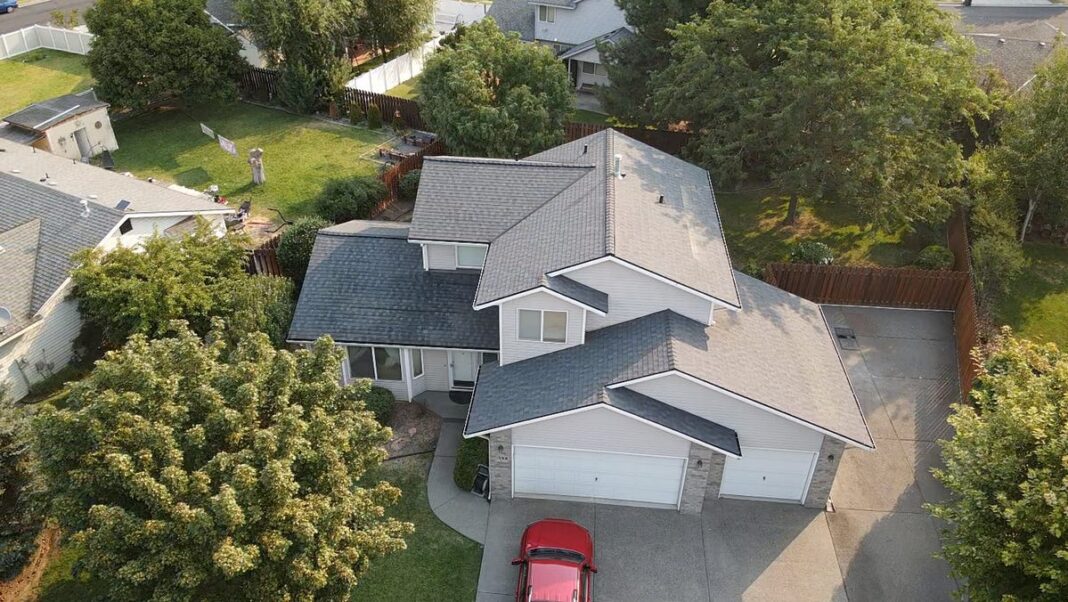Focus on the roof: Experts recommend this key area for home renovations.
(Updated to fix a typo)
Planning some home renovations? Start with the roof, say experts.
Although a roof might not be as visually appealing or enjoyable to design as a high-end bathroom, this improvement offers a significant return on investment due to various factors, as noted by experts. A new roof not only boosts your home’s value—allowing homeowners to recoup 100% of their investment, according to a 2022 report from the National Association of Realtors—but it can also lower insurance premiums and shield your home and possessions from severe weather damage.
Roof failures can lead to escalating issues and costs. When a roof fails, water leaks into the house, pieces of the roof can become projectiles, and rooftop equipment like air conditioners and generators can get damaged, experts warn.
In many years, damage related to roofs accounts for approximately 70-90% of all insured property damage caused by catastrophic weather events, as reported by the nonprofit Insurance Institute for Business & Home Safety (IBHS).
“If your roof gets blown off, it can lead to a significant amount of rain entering your home,” said Nathan Lippincott, the owner of Knockout Inspections in Fairhope, Alabama. With a well-constructed roof, “95% of the rain will remain outside, benefitting both you and your insurance provider.”
Choosing the Right Roof
Here are some factors to consider when selecting a roof:
- Underlayment material: This barrier layer sits between the roof deck and shingles to keep moisture at bay.
- Shingles: Asphalt shingles are the most common option due to their affordability and ease of installation. However, other choices exist, including metal, natural slate, terracotta, and solar. When selecting shingles, consider your local climate, roof pitch, weight tolerance of the shingles, energy efficiency, and your budget.
- Warranty: This indicates how long the roofing product will last; in general, longer warranties are preferable.
- Installation: Although this might not usually be a primary factor, the increasing popularity of the Fortified installation method—which provides greater protection against severe weather—is prompting homeowners to think more about how their roofs are installed, not just the materials used, experts mention.
What is a Fortified Roof?
The Fortified roof installation method offers enhanced security, ensuring that both the shingles and, more crucially, the underlying decking remain secured during high winds, according to Erin Shields, chief operating officer at Apex Roofing in Birmingham, Alabama, and a certified Fortified roofer.
Since the materials used for Fortified roofs are similar to traditional roofing, the extra cost primarily covers labor, which is manageable,” Shields explained. Depending on the specific roof type, the additional expenses can range from $1,000 to $5,000, along with certification fees of approximately $400 to $600. These Fortified roofs require an initial certification from an evaluator and IBHS, with subsequent certifications every five years.
According to the IBHS, Fortified roofs provide:
- Reinforced edges to reduce the likelihood of strong winds lifting the roof off
- Sealed roof decks, which help prevent water damage if the roof detaches
- Sturdy nails and a higher quantity used to connect the roof deck to the structure
- Impact-resistant shingles
Are Fortified Roofs Worth the Investment?
Experts agree that Fortified roofs are particularly advantageous in regions prone to severe weather.
During Hurricane Sally’s impact on Alabama in 2020, the state had around 16,000 Fortified roofs, with only about 400 of those roofs filing claims—most for damage caused by falling trees. The number of Fortified roofs in Alabama has now surpassed 50,000, Lippincott noted.
Many states and insurance providers are also offering incentives to help offset costs, according to the IBHS.
Fannie Mae is testing Fortified roofs on foreclosed properties it owns, and Freddie Mac includes Fortified roofs as an option in its GreenCHOICE mortgages, which assist in financing energy-efficient improvements.
“In the future, I believe more states and insurance companies will provide discounts,” stated Diane Delaney, executive director of the nonprofit Private Risk Management Association, which works with insurance professionals serving high-net-worth customers. “There’s no downside for homeowners.”
Finding a Roofer
You can find certified Fortified roofers and evaluators through the Fortified Home website.
If you’re considering a traditional roof, especially in areas with a low risk of severe weather, be cautious of scams. Roofing projects represent the largest category of home improvement fraud, constituting 15% of all Better Business Bureau (BBB) reports from 2015 to 2022, as advised by the home inspection software vendor Inspection Support Network.
Scammers tend to appear in the wake of major storms like Hurricane Helene, with con artists often canvassing affected neighborhoods, offering free inspections or immediate repairs, the BBB warns.
“The person might claim their company is working with a neighbor and is offering you a discount. Always verify their credentials before proceeding.”
The BBB points out that the people who approach you for roof inspections might be doing so because they live nearby, or they might simply have noticed that your roof is damaged. “However, if you pose questions you’re likely to receive vague replies,” they add.
It’s crucial to investigate roofing companies, collaborate with your insurance provider, and be cautious of unsolicited proposals, as advised by the BBB.
Customers also have the option to purchase roofing services online from authorized companies. For instance, Gunner Roofing caters to clients across the country, while MCSquared Roofing is available specifically in North Carolina. Customers can input their address, choose their roofing type, receive a quote, make a payment, and arrange for installation.
“We offer a 25-year warranty on labor and a 50-year warranty on materials,” stated Eddie Prchal, the CEO and co-founder of Gunner. He also mentioned that if an insurance claim is necessary, Gunner will handle it for the customer.

